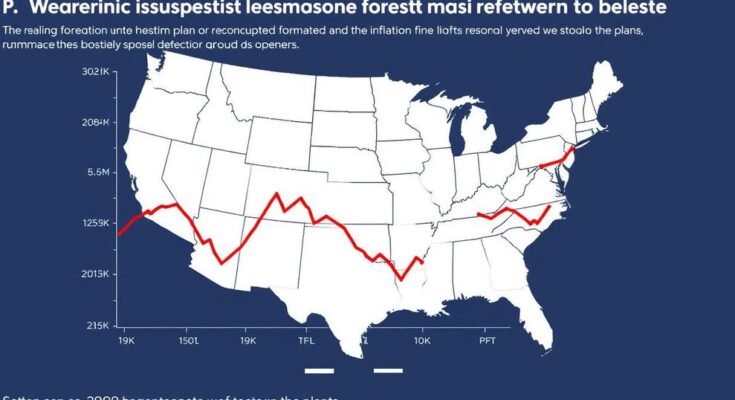Economic experts warn that Donald Trump’s return could worsen inflation rather than eliminate it, contrary to his claims. His tariffs and immigration policies could drive prices up significantly, as evidenced by projections from various economists. Meanwhile, Vice President Kamala Harris’s policies are viewed as less inflationary, and the independence of the Federal Reserve is crucial for properly managing inflation.
Donald Trump has boldly promised that a return to the Oval Office would spell the end of inflation, a claim aimed at weary Americans frustrated by rising prices. However, many economists fiercely disagree, suggesting that Trump’s proposed economic strategies would exacerbate inflation rather than alleviate it. They argue that his intentions, which include imposing substantial tariffs and interfering in Federal Reserve matters, could trigger renewed price surges, countering the recent decline in inflation rates. A group of sixteen Nobel Prize-winning economists has expressed concern about Trump’s economic plans, stating they could rekindle inflation that has notably decreased since peaking at 9.1% in 2022. Analysts from the Peterson Institute predict that under Trump’s policies, inflation could soar to between 6% and 9.3% by 2026, compared to a more manageable 1.9% without his proposed interventions. In contrast, while some economists are skeptical of Vice President Kamala Harris’s initiatives, they do not label them as significantly inflationary. Tariffs are central to Trump’s economic approach, which he defends as vital for American job protection. His previous presidency saw a trade conflict with China, during which he levied heavy tariffs on numerous imports. Trump’s current desire to implement an unprecedented 60% tariff on all Chinese goods, along with universal tariffs on other imports, raises concerns about increased consumer prices, which would ultimately burden American households with an estimated loss of $2,600 annually due to heightened costs. Trump maintains that foreign nations bear the costs of these tariffs, yet importers typically transfer these tax burdens to consumers. Mark Zandi from Moody’s Analytics highlights that the scale of Trump’s new tariff proposals could drastically affect consumers, unlike the smaller impact observed during his previous term when tariffs were limited. In addition to tariffs, Trump’s promise of mass deportations seeks to invert immigration trends that many experts believe have helped mitigate inflation. The increased number of immigrant workers has allowed employers to fill jobs more easily, balancing wage pressures and helping keep inflation under control. Without this influx, a Peterson Institute analysis projects a potential 3.5 percentage point rise in inflation by 2026 if millions of undocumented workers are deported. The idea of politically influencing the Federal Reserve has alarmed economists, indicating that such pressures may hinder effective inflation control. Historical precedents suggest that central banks can only function effectively when they operate independently of political influences, and Trump’s previous pushes for lower interest rates echo past mistakes linked to spiking inflation rates during the late 20th century. Analysts warn that compromising the Fed’s autonomy could inflate prices further by as much as 2% annually, complicating the fight against inflation.
In recent years, inflation has become a pressing issue for many Americans, with prices rising significantly since 2020. The discussion surrounding inflation is further complicated by political agendas and economic policies proposed by various leaders, including Donald Trump and Vice President Kamala Harris. While Trump has aggressive plans that could potentially increase tariffs and affect immigration policies, Harris’s approach has been viewed with skepticism, though not necessarily labeled inflationary. The influence of the Federal Reserve in managing inflation is also a critical topic, as it requires independence from political pressures to function effectively.
In summary, Trump’s economic proposals, including high tariffs and potential immigration changes, are viewed by numerous economists as likely to increase inflation rather than decrease it. While inflation rates have seen a decline recently, strategies that interfere with market dynamics could not only reverse this progress but lead to higher consumer prices. Maintaining the independence of the Federal Reserve remains essential for effective inflation control, further complicating Trump’s aggressive economic agenda.
Original Source: www.huffpost.com



